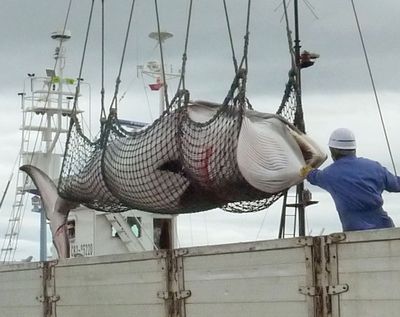UN court orders Japan to halt whaling in Antarctic

The United Nations’ highest court on Monday ruled that Japan’s Antarctic whaling operations are not for “scientific purposes” as Tokyo claims and ordered an immediate halt to the practice.
In a 12-4 ruling, the International Court of Justice said Japan failed to demonstrate during a three-week trial last year that its claimed right to harvest about 1,000 whales each year was for scientific research.
“The evidence does not establish that the program’s design and implementation are reasonable in relation to achieving its stated objectives,” the court’s presiding judge, Peter Tomka, read from the ruling. The court ordered Japan to cease its whaling operations in the Southern Ocean “with immediate effect.”
Australia lodged a complaint against Japan in 2010, accusing it of skirting the 1986 International Whaling Commission ban on killing the mammals by cloaking its operations “in the lab coat of science.” Of the 14,410 whales harvested for research purposes under the ban’s exclusions since it went into effect 28 years ago, about 95 percent were killed by Japanese whaling crews, Australia said in its court filings. Prior to the ban, about 2,100 whales were killed for scientific research purposes in a 34-year period during which such statistics were kept, the court documents said.
During the trial last June, Japan presented only two scientific reports based on the harpooning of 3,600 minke whales and a handful of fin whales during a seven-year period.
In a statement submitted to the court after its ruling, a Japanese government spokesman said Japan was “disappointed and regrets” the decision that its program does not meet the criteria for whaling for scientific purposes. But the government will comply with the court ruling, the statement said.
The U.N. court’s ruling was cheered by environmentalists and animal rights advocates worldwide, even though the halt to Japan’s Antarctic operations may be temporary and the ruling doesn’t constrain its smaller Pacific whaling fleet. The international court left open the possibility of Japan revising its scientific whaling program, known as JARPA II, to conform with the whaling commission ban’s exclusions criteria or to devise nonlethal methods of capturing whales for research purposes.
Two other states, Norway and Iceland, conduct commercial whaling in defiance of the 1986 ban.
Monday’s ruling “certainly has implications ultimately for whaling by Iceland and Norway as well,” Patrick Ramage, director of the International Fund for Animal Welfare’s whale program, told the Associated Press outside the international court in The Hague. “I think it will increase pressure on those two countries to re-examine their own whaling practices and the various reasons and pretexts given for that whaling activity.”